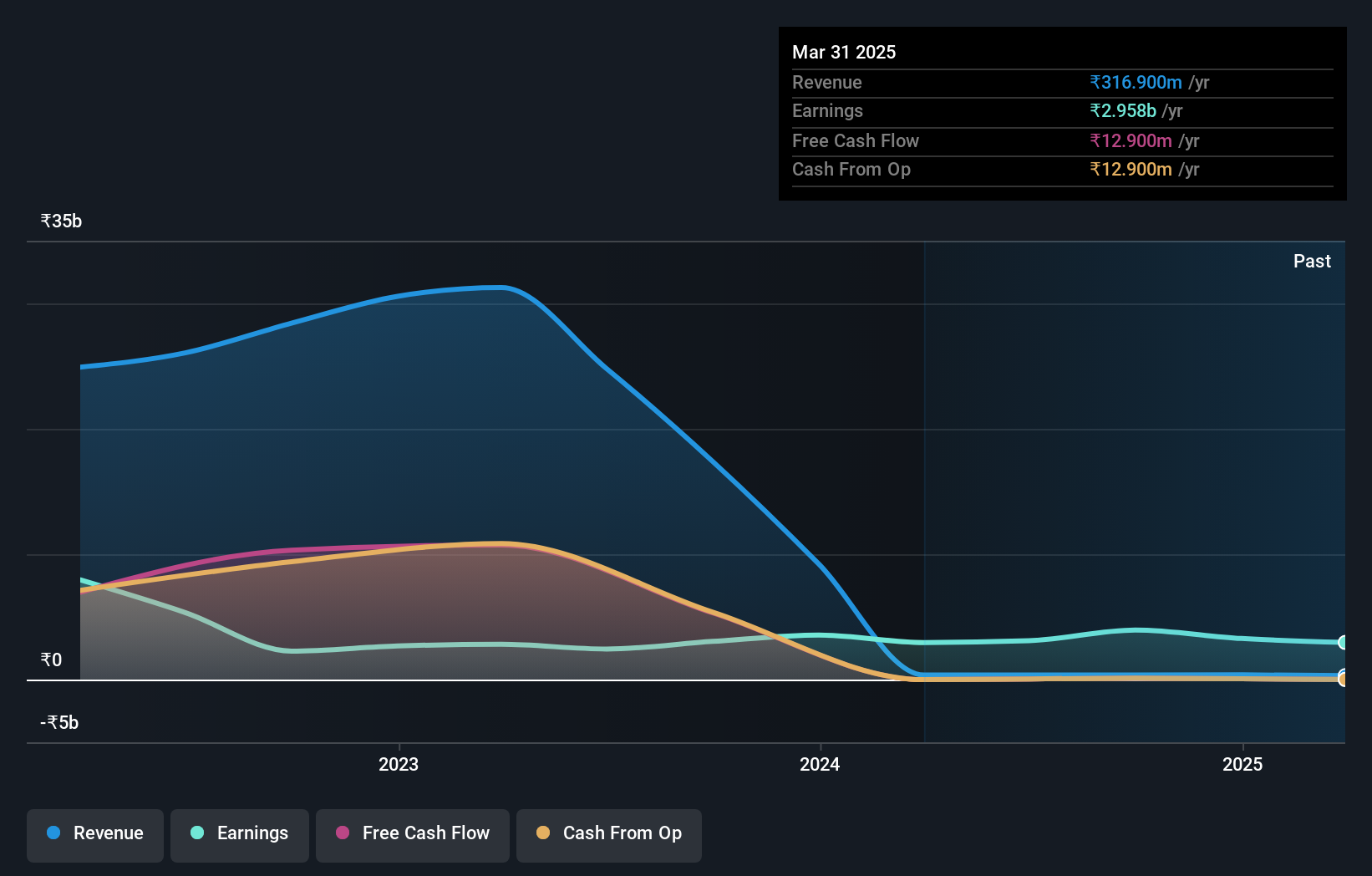- India
- /
- Capital Markets
- /
- NSEI:JPOLYINVST
Insiders were the biggest winners as Jindal Poly Investment and Finance Company Limited's (NSE:JPOLYINVST) market cap grew by ₹1.2b last week
Key Insights
- Insiders appear to have a vested interest in Jindal Poly Investment and Finance's growth, as seen by their sizeable ownership
- Shyam Jindal owns 51% of the company
- Ownership research, combined with past performance data can help provide a good understanding of opportunities in a stock
To get a sense of who is truly in control of Jindal Poly Investment and Finance Company Limited (NSE:JPOLYINVST), it is important to understand the ownership structure of the business. And the group that holds the biggest piece of the pie are individual insiders with 81% ownership. In other words, the group stands to gain the most (or lose the most) from their investment into the company.
Clearly, insiders benefitted the most after the company's market cap rose by ₹1.2b last week.
Let's take a closer look to see what the different types of shareholders can tell us about Jindal Poly Investment and Finance.
View our latest analysis for Jindal Poly Investment and Finance

What Does The Lack Of Institutional Ownership Tell Us About Jindal Poly Investment and Finance?
Institutional investors often avoid companies that are too small, too illiquid or too risky for their tastes. But it's unusual to see larger companies without any institutional investors.
There are many reasons why a company might not have any institutions on the share registry. It may be hard for institutions to buy large amounts of shares, if liquidity (the amount of shares traded each day) is low. If the company has not needed to raise capital, institutions might lack the opportunity to build a position. Alternatively, there might be something about the company that has kept institutional investors away. Jindal Poly Investment and Finance might not have the sort of past performance institutions are looking for, or perhaps they simply have not studied the business closely.

We note that hedge funds don't have a meaningful investment in Jindal Poly Investment and Finance. Shyam Jindal is currently the largest shareholder, with 51% of shares outstanding. This essentially means that they have extensive influence, if not outright control, over the future of the corporation. Meanwhile, the second and third largest shareholders, hold 24% and 1.9%, of the shares outstanding, respectively.
Researching institutional ownership is a good way to gauge and filter a stock's expected performance. The same can be achieved by studying analyst sentiments. As far as we can tell there isn't analyst coverage of the company, so it is probably flying under the radar.
Insider Ownership Of Jindal Poly Investment and Finance
The definition of company insiders can be subjective and does vary between jurisdictions. Our data reflects individual insiders, capturing board members at the very least. Management ultimately answers to the board. However, it is not uncommon for managers to be executive board members, especially if they are a founder or the CEO.
Most consider insider ownership a positive because it can indicate the board is well aligned with other shareholders. However, on some occasions too much power is concentrated within this group.
It seems that insiders own more than half the Jindal Poly Investment and Finance Company Limited stock. This gives them a lot of power. Given it has a market cap of ₹10.0b, that means they have ₹8.1b worth of shares. It is good to see this level of investment. You can check here to see if those insiders have been buying recently.
General Public Ownership
The general public, who are usually individual investors, hold a 19% stake in Jindal Poly Investment and Finance. While this size of ownership may not be enough to sway a policy decision in their favour, they can still make a collective impact on company policies.
Next Steps:
While it is well worth considering the different groups that own a company, there are other factors that are even more important. Be aware that Jindal Poly Investment and Finance is showing 2 warning signs in our investment analysis , and 1 of those is a bit concerning...
If you would prefer check out another company -- one with potentially superior financials -- then do not miss this free list of interesting companies, backed by strong financial data.
NB: Figures in this article are calculated using data from the last twelve months, which refer to the 12-month period ending on the last date of the month the financial statement is dated. This may not be consistent with full year annual report figures.
New: Manage All Your Stock Portfolios in One Place
We've created the ultimate portfolio companion for stock investors, and it's free.
• Connect an unlimited number of Portfolios and see your total in one currency
• Be alerted to new Warning Signs or Risks via email or mobile
• Track the Fair Value of your stocks
Have feedback on this article? Concerned about the content? Get in touch with us directly. Alternatively, email editorial-team (at) simplywallst.com.
This article by Simply Wall St is general in nature. We provide commentary based on historical data and analyst forecasts only using an unbiased methodology and our articles are not intended to be financial advice. It does not constitute a recommendation to buy or sell any stock, and does not take account of your objectives, or your financial situation. We aim to bring you long-term focused analysis driven by fundamental data. Note that our analysis may not factor in the latest price-sensitive company announcements or qualitative material. Simply Wall St has no position in any stocks mentioned.
About NSEI:JPOLYINVST
Jindal Poly Investment and Finance
Engages in investment activities in India.
Good value with acceptable track record.
Market Insights
Community Narratives




